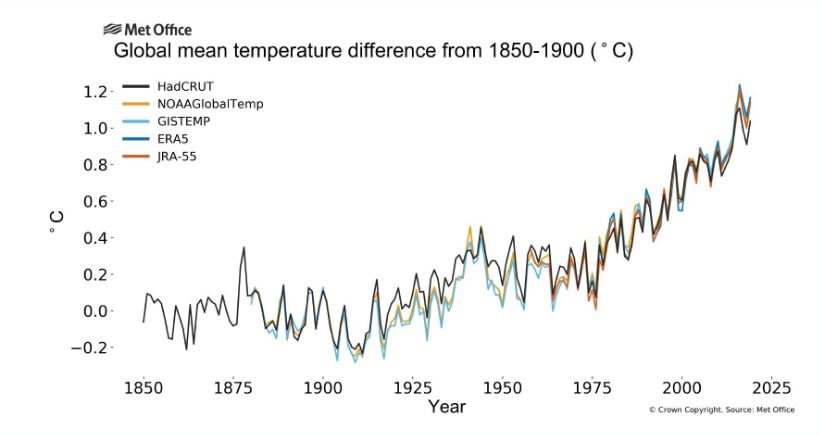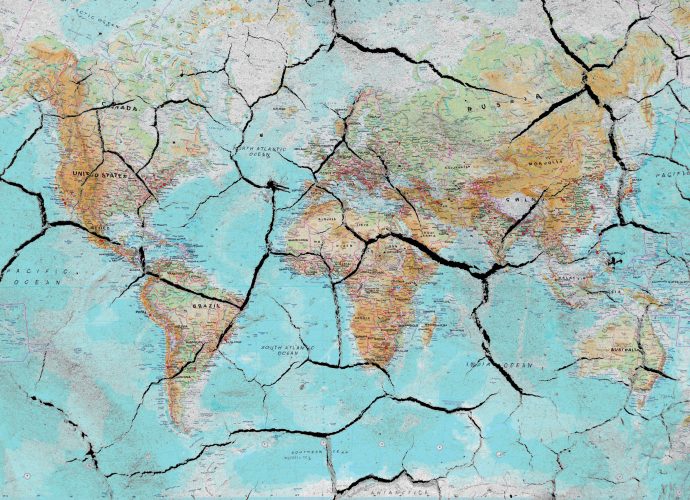Climate change and environmental destruction top the risks highlighted by world decision-makers at Davos.
For the first time the annual Global Risks Report, compiled by the World Economic Forum (WEF), found the top five concerns were all environmental, from extreme weather to biodiversity loss and events like oil spills and radioactive contamination.
This year’s Davos takes place against the backdrop of some of Australia’s worst ever bushfires. “The visibility of the impact of extreme weather events, wild fires, flooding, has heightened awareness,” said Emily Farnworth, WEF Head of Climate Change Initiatives.
According to the World Meteorological Organization (WMO), 2019 was the second warmest year on record since temperature records began in 1850. The annual global temperature in 2019 was 1.1°C warmer than the average for 1850-1900, used to represent pre-industrial conditions.

Source: World Meteorological Organization
Since the 1980s each decade has been warmer than the previous one, the WMO said. This trend is expected to continue because of record levels of heat-trapping greenhouse gases in the atmosphere. 2016 remains the warmest year on record because of the combination of a very strong El Niño event, which has a warming impact, and long-term climate change.
“The average global temperature has risen by about 1.1°C since the pre-industrial era and ocean heat content is at a record level,” said WMO Secretary-General Petteri Taalas. “On the current path of carbon dioxide emissions, we are heading towards a temperature increase of 3 to 5 degrees Celsius by the end of century.”
“The average global temperature has risen by about 1.1°C since the pre-industrial era and ocean heat content is at a record level. On the current path of CO2 emissions, we are heading towards a temperature increase of 3 to 5°C by the end of century” WMO SG Petteri Taalas pic.twitter.com/MywSs1eDTE
— WMO | OMM (@WMO) January 15, 2020
The 2020 Annual Meeting in Davos has chosen sustainability as its main theme and has invited environmental campaigners to discuss climate change and other environmental concerns with businesses and governments. Awarded the IS0 20121 standard for sustainable events in 2018, the Annual Meeting is fully carbon neutral through reducing, calculating and offsetting event-related emissions. Initiatives put in place to achieve this goal include using locally-sourced food suppliers, introducing alternative sources of protein to reduce meat consumption, sourcing 100% renewable electricity, and reducing or eliminating the use of materials that cannot easily be recycled or re-used, such as carpets and introducing more electric vehicles.
As reported by Reuters, last Friday Swedish activist Greta Thunberg, who launched the #FridaysforFuture movement, marched with 10,000 protesters in the Swiss city of Lausanne to deliver the message “It is late but it is not too late” to the elites. “To the world leaders and those in power, I would like to say that you have not seen anything yet,” warned Greta Thunberg in her speech in Lausanne. “You have not seen the last of us, we can assure you that. And that is the message that we will bring to the World Economic Forum in Davos next week.”
“It is time to abolish billionaires,” said a Kenyan activist, Njoki Njoroge Njehu, in Lausanne. “It is time to abolish billionaires, because we cannot afford them, the planet cannot afford billionaires,” she said.
To tackle the negative impact of environmental destruction, WEF founder and executive chairman Klaus Schwab has announced plans to launch a scheme using public and private funds to plant one trillion trees by the end of this decade.
Additional reporting by Barbara McGuinn
Image by Onur / Adobe Stock











Thanks!
Our editors are notified.